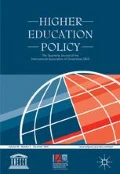Abstract
The Dutch higher education and research system has incrementally changed during the last decade. Several reforms, initiated by the government, have hinted towards influencing the basic processes within universities, such as research programming. However, it is largely unknown how these reforms have been implemented at the university shop floor level. Are the core activities of academics influenced by the reforms? Do academics still enjoy the academic freedom as they used to do? In this paper, we address the responses of four research units to changed institutional environments (two units in biotechnology and two in medieval history). Based on 33 interviews, we mapped their views on present-day research programming and problem choice in their units. The results show that the research units preserve their own research agenda to a large extent: the academic credibility process is paramount.
Similar content being viewed by others
References
Amaral, A., Jones, G.A. and Karseth, B. (2002) Governing Higher Education: National Perspectives on Institutional Governance, Dordrecht/Boston/London: Kluwer Academic Publishers.
Biglan, A. (1973) ‘The characteristics of subject matter in different academic areas’, Journal of Applied Psychology 57 (3): 195–213.
Blume, S.S., Spaapen, J.B. and Prins, A.A.M. (1985) De externe beoordeling van wetenschappelijk onderzoek aan Nederlandse universiteiten en hogescholen. Twee jaar Voorwaardelijke Financiering: een leerprocess, s-Gravenhage: Staatsdrukkerij.
Braun, D. and Merrien, F.X. (1999) ‘Governance of Universities and Modernisation of the state’, in D. Braun and F.X. Merrien (eds.) New Managerialism and the Governance of Universities in a Comparative Perspective 53 edn., London and Philadephia: Jessica Kingsley Publishers, pp. 9–34.
de Boer, H. (2003) ‘Who's Afraid of Red, Yellow and Blue? The Colourful World of Management Reforms’, in A. Amaral, V.L. Meek and I.M. Larsen (eds.) The Higher Education Managerial Revolution?, Dordrecht/Boston/London: Kluwer Academic Publishers.
de Boer, H., Denters, S.A.H. and Goedegebuure, L. (2000) ‘Dutch Disease of Dutch Model? An Evaluation of the Pre-1998 System of Democratic University Government in the Netherlands’, in R. Weissberg (ed.) Democracy and the Academy, Huntington, NY: Nova Science Publishers, pp. 123–140.
de Boer, H., Enders, J. and Leisyte, L. (2007) ‘Public sector reform in Dutch higher education: the organizational transformation of the university’, Public Administration 85 (1): 27–46.
de Boer, H., Enders, J. and Schimank, U. (2007) ‘On the Way Towards New Public Management? The Governance of University Systems in England, the Netherlands, Austria, and Germany’, in D. Jansen (ed.) New Forms of Governance in Research Organizations — Disciplinary Approaches, Interfaces and Integration, Dordrecht: Springer, pp. 137–154.
de Boer, H. and Huisman, J. (1999) ‘The New Public Management in Dutch Universities’, in D. Braun and F.X. Merrien (eds.) Towards a New Model of Governance for Universities 53 edn., London and Philadelphia: Jessica Kingsley Publishers, pp. 100–118.
de Vijlder, F.J. and Mertens, F.J.H. (1990) ‘Hoger onderwijs-arbeidsmarkt: zorgenkind of betekenisvol perspectief?’, Tijdschrift voor Hoger Onderwijs 8 (2): 42–54.
Gibbons, M., Limoges, C., Nowotny, H., Schwartzman, S., Scott, P. and Trow, M. (1994) The New Production of Knowledge, London: Sage.
Goedegebuure, L., Kaiser, F., Maassen, P., Meek, L., Vught, F.A.v. and Weert, E.d. (1994) Higher Education Policy. An International Perspective, Oxford: IAU & Pergamon.
Hazeu, C.A. (1989) Systeem en gedrag in het wetenschappelijk onderzoek, s-Gravenhage: Vuga.
Henkel, M. (2005) ‘Academic identity and autonomy in a changing policy environment’, Higher Education 49 (1–2): 155–176.
Jongbloed, B. and van der Meulen, B. (2006) De follow-up van onderzoeksvisitaties. Onderzoek in opdracht van de Commissie Dynamisering. Eindrapportage. Investeren in dynamiek. Eindrapport commissie Dynamisering (deel 2), Enschede: CHEPS.
Knorr-Cetina, K.D. (1982) ‘Scientific communities or transepistemic arenas of research? A critique of quasi-economic models of science’, Social Studies of Science and Public Policy 12: 101–130.
Latour, B. and Woolgar, S. (1979) Laboratory Life: The Construction of Scientific Facts, Beverly Hills/London: Sage Publications.
Lehenkari, J. (2003) ‘On the borderline of food and drug: constructing credibility and markets for a functional food product’, Science as Culture 12 (4): 499–525.
Leisyte, L. (2007) University Governance and Academic Research, Enschede: CHEPS, University of Twente.
Lucas, L. (2006) The Research Game in Academic Life, Maindenhead: SRHE/Open University Press.
Maassen, P. and Van Vught, F.A. (1988) ‘An intriguing Janus-head. The two faces of the new governmental strategy for higher education in the Netherlands’, European Journal of Education 23: 65–76.
MOCW. (2000) Hoger onderwijs en onderzoek plan [HOOP; Higher Education and Research Plan], Den Haag: Ministerie van Onderwijs, Cultuur en Wetenschap.
MOCW. (2005) Wergevingsnotitie ′Naar een nieuwe wet op het hoger onderwijs en onderzoek′, Den Haag: Ministerie van Onderwijs, Cultuur en Wetenschap.
Morris, N. (2004) Scientists Responding to Science Policy, Enschede: University of Twente.
Oliver, C. (1991) ‘Strategic responses to institutional processes’, Academy of Management Review 16 (1): 145–179.
Sabatier, P. (1999) Theories of the Policy Process, Oxford: Westview Press.
van Rossum, W. (1987) Sturing van wetenschap. De rol van onderzoekorganisaties, s-Gravenhage: Ministerie van Onderwijs en Wetenschappen.
Yin, R.K. (2003) Case Study Research: Design and Methods 3rd edn., Thousand Oaks, London, New Delhi: Sage Publications.
Ziman, J. (2000) Real Science. What it is, and What it Means, Cambridge: Cambridge University Press.
Author information
Authors and Affiliations
Rights and permissions
About this article
Cite this article
Leisyte, L., Enders, J. & De Boer, H. The Freedom to Set Research Agendas — Illusion and Reality of the Research Units in the Dutch Universities. High Educ Policy 21, 377–391 (2008). https://doi.org/10.1057/hep.2008.14
Published:
Issue Date:
DOI: https://doi.org/10.1057/hep.2008.14



